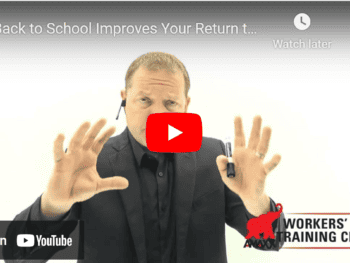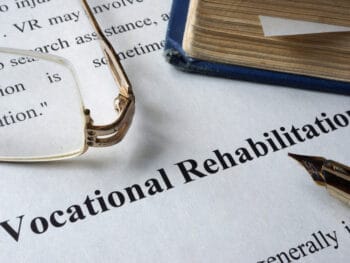
A handful of bad apples can ruin it for everyone, but for the most part, people just want to get back to their normal routine. When injured, workers are usually in pain, receiving less money than they are used to, and traveling back and forth to doctor’s offices for examinations and therapy. A revolving statistic may state that up to 10% of claims filed are not necessarily legitimate. That leaves 90% just looking to heal and return to pre-injury status. Some injured workers even heal or return to work quicker than expected. But why? It seems obvious, but let’s explore some of the reasons in more detail:
Click Link to Access Free PDF Download
“13 Research Studies to Prove Value of Return-to-Work Program & Gain Stakeholder Buy-In”
- Loss of income
The most significant factor for an injured worker wanting to go back to regular duty is the income they receive. There aren’t many people out there who can get rich off of receiving work comp pay. Typically, they receive a percentage of the income they are used to receiving, ranging from 60% to 80% of their net income.
Even in dual-income families, this loss of income can be substantial, especially for those who are living from paycheck to paycheck. Do not be surprised when your injured worker is rushing to return to normal. You should be all set as long as a qualified doctor releases them to work with no medical restrictions. Of course, this will vary depending on the injury. I have handled cases when the claimant is adamant about making the doctor return them to work, and the physician will indicate in the notes that they are just returning the patient back to full duty because that is what the patient requests. You have to be very careful in this situation to avoid further injury, so if this should happen, review it on a case-by-case basis.
-
The claimant is bored if they are totally out of work and sitting at home
Sitting at home in an empty house with nothing to do can be even worse than light duty. There is only so much daytime TV one can stomach. It is no coincidence that most plaintiff law firm commercials run during the morning and afternoon when injured workers would be home while disabled from work.
The vast majority of workers like working, or at least need to work for income, and even though sitting at home for weeks sounds great it is indeed not so great after a while. It’s not like they can do whatever they want. In fact, this is what will land most workers in trouble because once boredom creeps in, they start to get outside and do something to take their mind off of being at home, and if you have surveillance on that certain day, this can land a person’s case in suspension or denial due to them breaking their medical restrictions, whether it be on purpose or not. I have seen many injured workers say they just cannot sit at home any longer and want to return to work.
-
The claimant hates being involved with the adjuster and the carrier/TPA
Most claimants are new to being on work comp. They have no idea what they are supposed to do, they do not like treating with the occupational doctor, and they hate sitting around and waiting for a paycheck to come in the mail that may take weeks to come once the investigation is complete. In fact, I have had some workers who have had a legitimate work injury decline filing a claim under work comp and choose to cover the bills from their medical care another way. This is especially true if they have had a messy comp case in the past. They are so jaded about how the process works that they will avoid it at all cost. This is not necessarily the right thing to do, but the overall choice is up to the worker. Realistically, the carrier is not going to try to talk the injured worker into filing the claim.
FREE DOWNLOAD: “13 Research Studies to Prove Value of Return-to-Work Program & Gain Stakeholder Buy-In”
-
They think that a work comp case is going to be a litigation nightmare.
Taking this one step further, some workers have heard horror stories about being on work comp and being embroiled in a years-long litigation battle, with mounting attorney fees and a life filled with misery. Sure, this could be true sometimes, but not as much as the general public thinks. Despite what the adjuster may tell them, we can’t make the worker pull the trigger and file the claim.
-
The worker just heals faster than expected.
Some people just heal better and quicker than others. This is due to conditioning, genetics, the type of injury, the location of the injury, the severity of the injury, and so on. If the adjuster thinks that it can take 6-8 weeks to heal from a back strain, and the worker is released to full duty in 2 weeks, this doesn’t mean that they are just in a rush to get back to gainful employment. If the medical checks out, and the treating doctor signs off on it, then so be it. Full duty is full duty. Adjusters should not hold this against a person just because they heal better or quicker than we thought they would.
Summary
There are many more factors to add to this article, but in my opinion, the 5 above are the most tangible. This should prove that all claims shouldn’t be placed in the “bad” category. Put yourself in the shoes of your injured worker. Their money is not the same, they are in some sort of pain, their job tasks have changed, they are dealing with the adjuster and the carrier/TPA, etc. They are in uncertain waters. The common response to that is to get back to whatever they think is their normal life as soon as possible, so they can put this all behind them.

Contact: mstack@reduceyourworkerscomp.com.
Workers’ Comp Roundup Blog: http://blog.reduceyourworkerscomp.com/
©2023 Amaxx LLC. All rights reserved under International Copyright Law.
Do not use this information without independent verification. All state laws vary. You should consult with your insurance broker, attorney, or qualified professional.

















